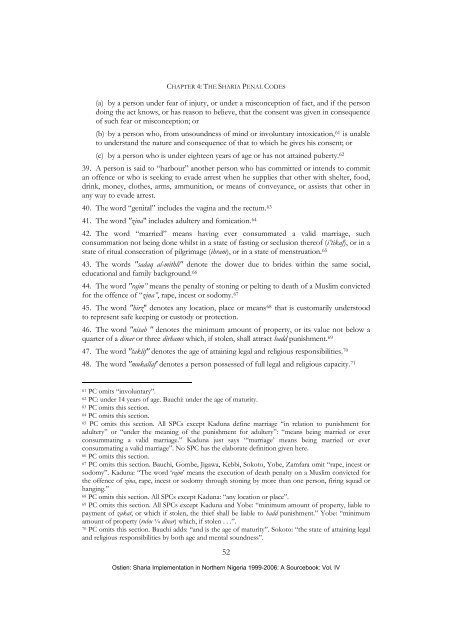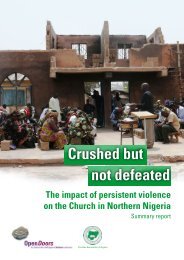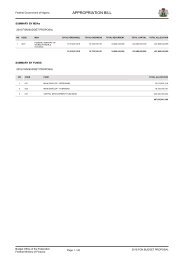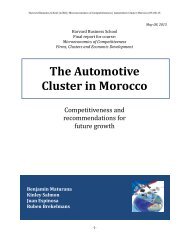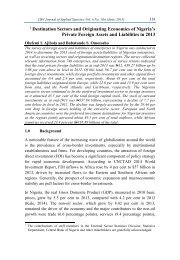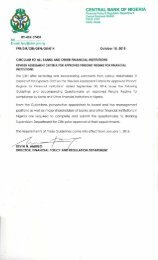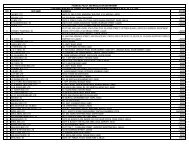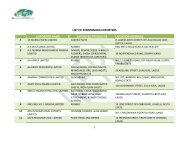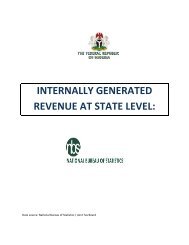vol_4_4_chapter_4_part_III
vol_4_4_chapter_4_part_III
vol_4_4_chapter_4_part_III
You also want an ePaper? Increase the reach of your titles
YUMPU automatically turns print PDFs into web optimized ePapers that Google loves.
CHAPTER 4: THE SHARIA PENAL CODES<br />
(a) by a person under fear of injury, or under a misconception of fact, and if the person<br />
doing the act knows, or has reason to believe, that the consent was given in consequence<br />
of such fear or misconception; or<br />
(b) by a person who, from unsoundness of mind or in<strong>vol</strong>untary intoxication, 61 is unable<br />
to understand the nature and consequence of that to which he gives his consent; or<br />
(c) by a person who is under eighteen years of age or has not attained puberty. 62<br />
39. A person is said to “harbour” another person who has committed or intends to commit<br />
an offence or who is seeking to evade arrest when he supplies that other with shelter, food,<br />
drink, money, clothes, arms, ammunition, or means of conveyance, or assists that other in<br />
any way to evade arrest.<br />
40. The word “genital” includes the vagina and the rectum. 63<br />
41. The word "zina" includes adultery and fornication. 64<br />
42. The word “married” means having ever consummated a valid marriage, such<br />
consummation not being done whilst in a state of fasting or seclusion thereof (i’tikaf), or in a<br />
state of ritual consecration of pilgrimage (ihram), or in a state of menstruation. 65<br />
43. The words "sadaq al-mithli" denote the dower due to brides within the same social,<br />
educational and family background. 66<br />
44. The word "rajm” means the penalty of stoning or pelting to death of a Muslim convicted<br />
for the offence of “zina”, rape, incest or sodomy. 67<br />
45. The word "hirz" denotes any location, place or means 68 that is customarily understood<br />
to represent safe keeping or custody or protection.<br />
46. The word "nisab " denotes the minimum amount of property, or its value not below a<br />
quarter of a dinar or three dirhams which, if stolen, shall attract hadd punishment. 69<br />
47. The word "taklif" denotes the age of attaining legal and religious responsibilities. 70<br />
48. The word "mukallaf' denotes a person possessed of full legal and religious capacity. 71<br />
61 PC omits “in<strong>vol</strong>untary”.<br />
62 PC: under 14 years of age. Bauchi: under the age of maturity.<br />
63 PC omits this section.<br />
64 PC omits this section.<br />
65 PC omits this section. All SPCs except Kaduna define marriage “in relation to punishment for<br />
adultery” or “under the meaning of the punishment for adultery”: “means being married or ever<br />
consummating a valid marriage.” Kaduna just says “‘marriage’ means being married or ever<br />
consummating a valid marriage”. No SPC has the elaborate definition given here.<br />
66 PC omits this section.<br />
67 PC omits this section. Bauchi, Gombe, Jigawa, Kebbi, Sokoto, Yobe, Zamfara omit “rape, incest or<br />
sodomy”. Kaduna: “The word ‘rajm’ means the execution of death penalty on a Muslim convicted for<br />
the offence of zina, rape, incest or sodomy through stoning by more than one person, firing squad or<br />
hanging.”<br />
68 PC omits this section. All SPCs except Kaduna: “any location or place”.<br />
69 PC omits this section. All SPCs except Kaduna and Yobe: “minimum amount of property, liable to<br />
payment of zakat, or which if stolen, the thief shall be liable to hadd punishment.” Yobe: “minimum<br />
amount of property (rubu ¼ dinar) which, if stolen . . .”.<br />
70 PC omits this section. Bauchi adds: “and is the age of maturity”. Sokoto: “the state of attaining legal<br />
and religious responsibilities by both age and mental soundness”.<br />
52


